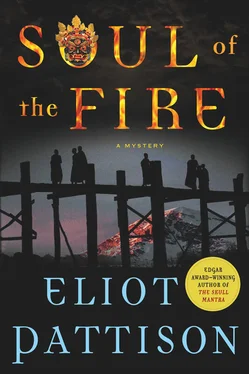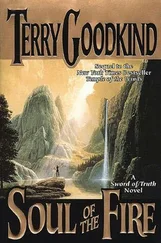Eliot Pattison - Soul of the Fire
Здесь есть возможность читать онлайн «Eliot Pattison - Soul of the Fire» весь текст электронной книги совершенно бесплатно (целиком полную версию без сокращений). В некоторых случаях можно слушать аудио, скачать через торрент в формате fb2 и присутствует краткое содержание. Год выпуска: 0101, ISBN: 0101, Издательство: St. Martin, Жанр: Полицейский детектив, на английском языке. Описание произведения, (предисловие) а так же отзывы посетителей доступны на портале библиотеки ЛибКат.
- Название:Soul of the Fire
- Автор:
- Издательство:St. Martin
- Жанр:
- Год:0101
- ISBN:9781250036476
- Рейтинг книги:4 / 5. Голосов: 1
-
Избранное:Добавить в избранное
- Отзывы:
-
Ваша оценка:
- 80
- 1
- 2
- 3
- 4
- 5
Soul of the Fire: краткое содержание, описание и аннотация
Предлагаем к чтению аннотацию, описание, краткое содержание или предисловие (зависит от того, что написал сам автор книги «Soul of the Fire»). Если вы не нашли необходимую информацию о книге — напишите в комментариях, мы постараемся отыскать её.
Soul of the Fire — читать онлайн бесплатно полную книгу (весь текст) целиком
Ниже представлен текст книги, разбитый по страницам. Система сохранения места последней прочитанной страницы, позволяет с удобством читать онлайн бесплатно книгу «Soul of the Fire», без необходимости каждый раз заново искать на чём Вы остановились. Поставьте закладку, и сможете в любой момент перейти на страницу, на которой закончили чтение.
Интервал:
Закладка:
Dolma motioned Shan to help her prepare their table. Moments later, Tserung pronounced the meal ready and served out a mutton and onion stew. Lokesh, without acknowledging Shan, silently rose and sat to eat. No one spoke. Shan picked at the fragrant stew and looked around the room. Half the old thangkas were missing. In the shadows, a small wooden trunk stood open. Dolma and Tserung were preparing to leave their beloved home.
When Dolma finished clearing the dishes, she consulted her old pocket watch. “We need you in the shed again,” she said to Shan. He looked up in surprise, then saw that Tserung and Lokesh were in the back, waiting by the tarchen pole.
A compact figure sprang out of the shadows as they approached the shed. Sergeant Gingri was guarding the door. Inside, a dozen grim-faced villagers sat in silence, waiting for Dolma to turn on the receiver. Several were quietly weeping.
The radio hummed to life, and for the first minute they listened in silence to music, then after a chime came the personal announcements. The villagers turned eagerly toward Shan, who began translating. An abbott had turned eighty-five. The Dalai Lama was giving teachings in Germany. The announcer suddenly paused, as if for effect. “For Dolma and Tserung, your son says the package arrived with no breakage. All is well.” A gleeful cry burst from Dolma, and she embraced Tserung. Several of the villagers broke into laughter, some wept, but now the tears were of joy. Sergeant Gingri beamed and slapped Shan on the back.
“Dawa is safe in Dharamsala!” Dolma explained.
“Lha gyal lo!” Lokesh exclaimed, and the call was taken up by all the others. After the moment of celebration, the smiles took on an air of melancholy. Dawa was safe, but they had paid for it dearly.
As the shed quieted, Dolma motioned for Shan to resume his translation. The old woman and her husband, with Sergeant Gingri at their side, listened attentively again. Lokesh gazed at the radio with a curious expression, as if the sudden messages from the other side of the Himalayas were too much to comprehend. There was a glint of something else in the old man’s eyes, a grim determination that Shan had not seen before. The gentle old Tibetan had vowed to give his life and was convinced the immolation protests had to continue.
“Finally, for Lokesh of the First Department of Revenue, pray now to the Future Buddha.”
Shan translated the words without thinking, then hesitated and repeated them. Lokesh looked up in wonder. “The First Department?” he said with a disbelieving smile. “That was my office in the government!”
Shan nodded slowly, not understanding, then saw Tserung and Dolma waiting at the door. Back in the house, Lokesh lowered himself to the little figure of Maitreya the Future Buddha.
The mantra Lokesh started quickly faded away as he noticed an envelope under the bronze figure. His name was written on it. Shan sat beside him as he opened it. A small coin fell out, a dontse, one of the rare coins of the old Tibetan government.
“‘My dear friend Lokesh,’” the old man began to read, then with a trembling hand he passed it to Shan. “It’s from her!” he exclaimed with wonder in his voice. Dolma and Tserung gathered close as Shan continued the letter.
“‘There is a ledger in Dharamsala of government workers,’” Dawa wrote, “‘and we have added your name, with a note that your service has continued uninterrupted for all these decades. Your service continues to be required. Have no doubt about your official business, for this coin is your official compensation. You are directed to return to the temple of Taktsang, where you will serve as the official librarian. You are further directed to record the chronicle of your years, to be enshrined in the official records of the government in Dharamshala. I don’t know if I will ever be a mother, Lokesh, but if so, I would want my child to know the miracle of your life.’”
Lokesh upturned the envelope onto his palm. The severed half of his identify card fell out, with a red ribbon tied to it. His life had been ransomed.
Shan waited at the gate the next morning with a small backpack hanging on one shoulder. He had arrived at Zhongje with nothing and was leaving with only two bottles of water and a few apricots given him by Dolma. It was early, but after saying good-bye to the old Tibetans, he would need to find a truck going east in the hope of reaching Lhadrung County before nightfall. With Tan incapacitated, Pao would find Shan, sending brutes to take him to a new and distant prison, but first he had to find a way to see his son, Ko, to say good-bye to him for a few years.
Pao walked out of the town hall leading his retinue of attendants and minor officials. When he spied Shan, his thin smile widened, and he spoke to a knob, who pulled Shan out of the crowd. “You know you cannot hide from me,” Pao declared. “The first thing I do when I reach Lhasa will be to issue two orders. First to teach you to meddle in the affairs of the Party. Five years in the desert sounds about right.” Shan returned his gaze without speaking. “There may have been an agreement with Dawa, but I am not bound if she is dead. Next, I will sign the order to reduce Yamdrok to rubble!”
“Lha gyal lo,” Shan said in a steady voice.
Pao slapped him.
Shan watched as the Deputy Secretary paraded toward his car, shaking hands with some onlookers and waving to others. Tuan, in suit and tie, waited behind the wheel. Pao had won, though not everything. The Commission was gone, Dawa was safely out of China, and Lokesh was safe. It was the kind of victory Shan knew he had to settle for in Tibet, and the memory of it would help him endure his five years in the desert gulag.
Tuan gestured him toward the car. “I learned much, Rinpoche,” he said. He wore a strangely serene smile.
“I am no teacher,” Shan protested. Tuan had been trusted by Dawa and Hannah with their secret plan. At the shepherd’s hut, he had agreed to help them with their subterfuge by making sure Sung believed Dawa was on the slope. That unlikely trust had made everything possible, including the calm smile now on Tuan’s face. He had found forgiveness, and more. He was closer than any of them to Hannah when she’d ignited herself, witnessed the vast courage, both of spirit and body, the American woman had shown.
“You are the best teacher I ever had. I was blind, and you made me see. My mother would not be proud of my life, but maybe there will be pieces of it she would be proud of.”
“Dammit, Tuan!” Pao snarled as he climbed into the backseat. “I have an appointment in Lhasa. Drive!”
Tuan seemed not to hear. He held up his hand, showing how he had made a ring out of the hair of the sacred white yak, then he smiled at Shan again and handed him an envelope.
Confused, Shan accepted the envelope, then watched as Tuan began inching the big black utility vehicle through the crowd of officers and local dignitaries. As the car approached the gate, Shan opened the envelope and upended it onto his palm. A piece of familiar parchment and two pieces of plastic slid out, the two halves of Tuan’s identity card.
Shan’s heart went cold. “Nooo!” he shouted as the car left the gate. Strangely, it did not turn toward the Lhasa highway but moved in the opposite direction, up the gravel track toward Yamdrok. As Shan ran up the road after it, he could hear Pao cursing Tuan for being such a fool, and saw him slide forward to pound Tuan on the shoulder.
Tuan slammed the accelerator down. Shan kept running, to the bend that gave him a view of the road into the village.
“Tuan! Noooo!” he cried again as he finally understood.
The big black car left the road at the wind fangs, at such a speed that it continued through the air for a surprisingly long time before abruptly plummeting out of sight. A moment later came a terrible gnashing of metal from below. The fireball was so high tongues of flame could be seen over the edge of the cliff.
Читать дальшеИнтервал:
Закладка:
Похожие книги на «Soul of the Fire»
Представляем Вашему вниманию похожие книги на «Soul of the Fire» списком для выбора. Мы отобрали схожую по названию и смыслу литературу в надежде предоставить читателям больше вариантов отыскать новые, интересные, ещё непрочитанные произведения.
Обсуждение, отзывы о книге «Soul of the Fire» и просто собственные мнения читателей. Оставьте ваши комментарии, напишите, что Вы думаете о произведении, его смысле или главных героях. Укажите что конкретно понравилось, а что нет, и почему Вы так считаете.












